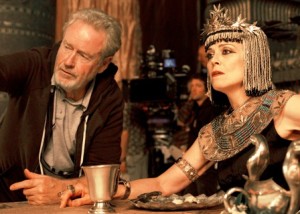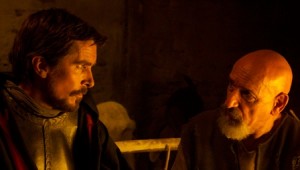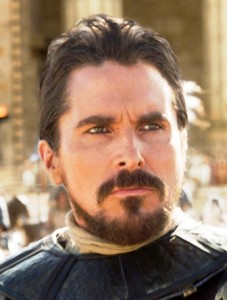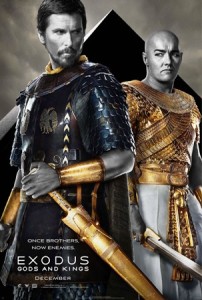Exodus movie: brother-enemies, slavery, liberation
By Rusty Wright
If you were an epic-adventure filmmaker and wanted a protagonist who could connect with over half the world’s population, Moses would be a prime candidate.
He’s revered by Christians, Muslims and Jews. The first five books of the Hebrew Bible are commonly called the “Books of Moses.” Jesus, in the New Testament, pointed skeptics to the “Book of Moses.” The Koran presents Moses as a prophet, “distinguished” in Allah’s sight.
Director/producer Ridley Scott (Gladiator) conveys Moses in Exodus: Gods and Kings as a valiant warrior and spiritual skeptic whom God surprises and prompts to liberate his compatriots from centuries of bondage. Sweeping 3-dimensional cinematography captures both massive impact and minute detail.
Brother-enemies
Stars include Academy-Award winners Christian Bale (The Dark Knight films) and Ben Kingsley (Gandhi), plus Sigourney Weaver (Alien, Avatar). There’s plenty of action and drama, centered on the Pharaoh Rameses and Moses, adoptive brothers who become enemies.
The biblical book of Exodus presents significant portions of Moses’ life paralleling the film’s time-frame. Born a Hebrew but raised with Egyptian royalty through surreptitious – providential? – circumstances, Moses became educated and respected. At about age 40, he killed an Egyptian assailant, then fled to escape punishment, spending 40 years in exile.
Burning bush; speaking truth to power
In a seminal moment, Moses believes God’s voice from a burning bush instructs him to return to Egypt, confront Pharaoh, and liberate his enslaved people. Moses pleads insignificance and ineloquence; God promises divine provision. Moses and his biological brother Aaron begin some classic speaking-truth-to-power showdowns.
“Thus says the Lord,” Moses declares to Pharaoh, “Let My people go.” “Who is the Lord that I should obey His voice?” responds Pharaoh, ordering his taskmasters to increase the Hebrew slaves’ workload.
A series of ten plagues follows – vividly portrayed in the film – interspersed with repeat encounters with Pharaoh (the film omits several encounters). The Nile River turns to blood. Frogs, gnats, and flies infest Egypt. All Egyptian livestock perishes. Boils cover humans and animals. Hail destroys humans, animals, crops and trees. Swarming locusts consume any remaining greenery. Darkness envelops Egypt for three days.
Throughout these first nine plagues, Pharaoh variously rejects Moses, expresses contrition, and breaks promises. The tenth plague has ramifications that will reverberate through history.
Passover: reverberating ramifications
Moses warns Pharaoh that God will kill every firstborn child. He instructs the Israelites to slay lambs and place some blood on their doorposts, explaining that God would “pass over” and spare such homes. This “Passover” sacrifice would become an ongoing memorial celebration of divine deliverance. Centuries later, Paul, a persecutor-turned-follower of Jesus, would write “Christ, our Passover Lamb, has been sacrificed for us,” calling Jesus’ death – which occurred during the Passover celebration over a millennium after Moses – a payment for human sin.
On the original Passover, Moses’ compatriots are spared but each Egyptian family suffers loss. Pharaoh actually implores the Hebrews to leave, but changes his mind and pursues them to the Red Sea. As the Egyptian soldiers near, Moses assures his people, “Do not fear! Stand by and see the salvation of the Lord….” God dramatically parts the sea, allowing the people to cross on land but swallowing up the Egyptian soldiers with returning waters. The liberated captives celebrate.
Read the book
Ridley Scott, who’s alternately called himself “agnostic” and “atheist,” portrays Moses as a military leader during Egyptian royalty years, and later as leading Israelites into battle against Egyptians. Biblical accounts are sketchy regarding Moses’ military exploits. Jewish historian Josephus describes Moses leading Egyptians in battle against Ethiopians. I’m unaware of ancient sources depicting him leading Israelites in battle against Egyptians. Perhaps this was a screenwriter’s extrapolation, as are several other film elements. (Example: God manifests as a little boy.)
Exodus: Gods and Kings is well worth watching, especially to stimulate interest in the timeless story. To best take it all in, I recommend reading Exodus 1-15 before the film, then again afterwards, discussing the two with others to discern similarities, differences and personal insights.
www.ExodusGodsAndKings.com Opens December 12 USA Worldwide opening dates
Rated PG-13 (USA) “for violence including battle sequences and intense images.”
Rusty Wright is an author and lecturer who has spoken on six continents. He holds Bachelor of Science (psychology) and Master of Theology degrees from Duke and Oxford universities, respectively. www.RustyWright.com
Copyright © 2014 Rusty Wright
# # #
Editors: Note pictures below. Click on image to access image file. More images – and higher resolution versions of these images – are here and here.

Ridley Scott and Sigourney Weaver confer on-set.
Photo Kerry Brown
© 2014 Twentieth Century Fox. All Rights Reserved.

Moses (Christian Bale) confers with Nun the Scholar (Sir Ben Kingsley).
Photo Kerry Brown
© 2014 Twentieth Century Fox. All Rights Reserved.

